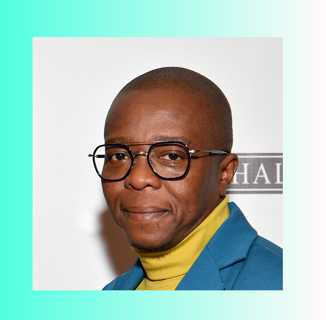For Fabi Reyna of Reyna Tropical, influences can be found everywhere. The band, which originally comprised Reyna and musician Sumo Hair, formed in June of 2016 at the Red Bull Academy writing camp at Bonnaroo. The two made music together for six years until Hair’s death in 2022.
2024 marked the release of Reyna Tropical’s debut album, Malegría. Reyna serves as lead guitarist and vocalist for the musical project now. Malegría is a sonically and culturally rich album, pulling influences from Congolese guitar stylings, Peruvian cumbia, and West Africa’s influence on the Guerrero region in Mexico.
“I thought a lot about that and studied that a good amount, as well as just nature sounds. Sounds of the ocean, sounds of birds, sounds of people talking, like movement, just movement. Yeah, I think those would be my biggest influences,” Reyna says for INTO. “I really don’t feel like there’s any one band that I listen to or that I can really reference. It was really like I was in movement and I was being influenced by all the music on the radio and taxis, on the street, Bullerengue, literally being next to the ocean for eight hours, things like that.”

Entertainment with an edge
Whether you’re into indie comics, groundbreaking music, or queer cinema, we’re here to keep you in the loop twice a week.
For those that have followed the band over the years, they will know that the phrase “Queer Love and Afro-Mexico” is central to Reyna Tropical’s art and message. Reyna tells me that this message is the foundation on which Malegría was built.
We talk about the erasure of African influence and Afro-Mexicans in Mexico, as well as the violence against queerness and sexism, and how despite that bias and discrimination, Afro-Mexicans and LGBTQ+ people have made a huge mark on what is considered Mexican culture. One person in particular that comes into the conversation is Chavela Vargas, a guitarist and vocalist from Costa Rica that lived much of her musical career in Mexico.
“Chavela Vargas is definitely the biggest lesbian icon in Mexico, and she’s not even Mexican. That made me just really want to step into that voice for the queer Mexican, Latin diaspora really,” she says. “Thinking too about how Chavela Vargas didn’t even come out until she was 80 years old. So, feeling really honored and excited to be able to be vocal about that as part of this album and in my own purpose with Reyna Tropical.”

Throughout the record, Reyna’s guitar skills shine. She sounds crisp, clear and electric. She also does all of the lead singing on the album, and her voice has grown more confident and strong over the years of Reyna Tropical.
It comes up on the album, on the interlude titled “Singing,” but Reyna didn’t always want to be known for her voice, and instead wanted to solidify herself as a great guitarist. When you listen to the album, it’s clear that she is gifted in both realms, and puts plenty of work into her practice.
“I think I solidified myself more as a singer on this record, and that was my first time,” she says. “This album is sort of my first time really diving deeper into my own voice as a singer, as a lyricist, even though I wrote most of the instruments on the album. Yes, the answer to your question is kind of yes at the same time, because I also felt like instrumentally, I was really proud of what I did.”
On tracks like “Cartagena,” where her voice is assertive and bold, or ones like “Movimiento,” where it’s much gentler, listening takes you on a journey through her growth and understanding of her musical self.
If you’ve been lucky enough to see a Reyna Tropical show live, you know that these shows are absolutely vibrating with life and energy. One thing that Reyna always makes time for is to acknowledge the indigenous populations that reside on the land where she is performing. She also will call on audience members to remember the ancestors that once inhabited this earth as well, and honor their contributions.
“A lot, if not all, of my writing is very improvisational, but with the intention of landing on land and being a voice for that land,” she explains. “Not necessarily the people, but being in conversation with the water and being in conversation with the earth and feeling like a vessel for that. I do feel, I really do feel that that has come through. A lot of lyrics I write, they’re not even my own experiences. They’re just what comes out in the moment. It feels more than anything like my offering to the land for allowing me to be there.”
For Reyna, the act of acknowledging those who’ve come before grounds her in the moment, as well as way a giving thanks.

“And so, recognizing the ancestors to me is like going into someone’s house and saying, ‘Thank you for letting me be here.’ Before I play and before I just make myself present, make myself known, and start singing and dancing, I just want to help everyone else land in the home that we’re in. It grounds me.”
On the interlude “Malegría,” we hear the voice of Sumo explaining the meaning of the word, which explores the natural duality of life. It doesn’t translate perfectly to English, but Hair explains that it can be a balance between happiness and sadness.
That duality is central to the album. On “Conocerla,” Reyna sings “What also gives her love, gives her pain.” There are many such examples on the album, and Reyna takes the time to explain it further.

“Because I’m experiencing joy, I have the space and the openness to see and be aware of the negativity or the things that are essentially bringing me a level of pain,” she adds. “The duality for me is… they’re not necessarily separate. I think that we think of duality as being the opposite or being far away from each other. It is this and this. But to me, it’s like maybe they start there and then eventually they intersect, and that’s where the creation happens. I just came from the intersection when I released Malegría, and now I’m opening back up into them being sort of parallel paths.”
Malegría is a journey through grief and joy, pleasure and pain. With it, Reyna cements herself as a rising star, a voice, and a talent to watch. If Reyna Tropical is playing a show near you, you won’t want to miss it.
Related:
Miss Benny is the trans icon we deserve
in the summer of 2023, Miss Benny rightfully received her flowers — and in 2024, more bouquets are no doubt on their way.
Sapphira Cristál and Monét X Change dish about the aural confections of ‘Soundcake’
INTO chatted with Sapphira and Monét about their duet debut and the hidden talents that might show up during “Soundcake.”
Don't forget to share:
Help make sure LGBTQ+ stories are being told...
We can't rely on mainstream media to tell our stories. That's why we don't lock our articles behind a paywall. Will you support our mission with a contribution today?
Cancel anytime · Proudly LGBTQ+ owned and operated
Read More in The INTO Interview
The Latest on INTO
Subscribe to get a twice-weekly dose of queer news, updates, and insights from the INTO team.
in Your Inbox















